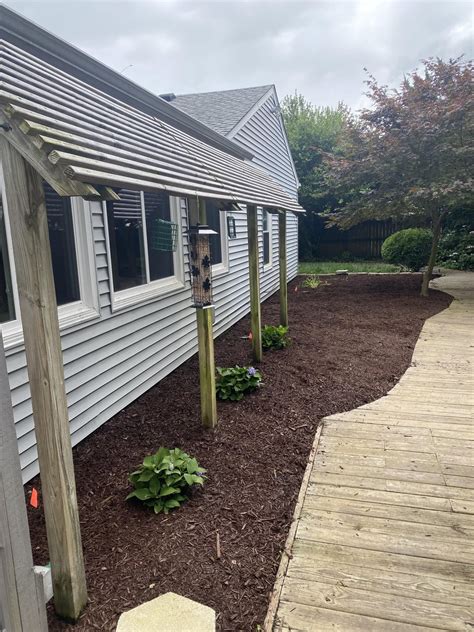
A Florida couple’s $27,000 landscaping project has devolved into a weed-infested nightmare, leaving them with a barren yard and alleging shoddy work and unfulfilled promises from the hired landscaper.
John and Lisa Smith (not their real names, names have been changed for privacy) of Pasco County, Florida, contracted with a local landscaping company in March to transform their lackluster yard into a vibrant outdoor oasis. The project, which included new sod, irrigation, and landscaping features, was slated for completion within a few weeks. However, the Smiths claim that the landscaper, after receiving the full payment of $27,000, failed to deliver on their agreement, leaving them with dead grass, malfunctioning sprinklers, and a growing frustration.
“We are devastated,” Lisa Smith told local news outlets. “We invested our savings into this project, dreaming of a beautiful yard where we could relax and entertain. Instead, we have a wasteland.”
The Smiths’ experience highlights the potential pitfalls homeowners face when hiring contractors and the importance of thorough research, detailed contracts, and vigilant oversight. The case also raises questions about the landscaper’s business practices and the recourse available to consumers who fall victim to substandard work.
According to the Smiths, the initial stages of the project seemed promising. The landscaper presented a detailed plan, showcasing lush lawns and colorful flowerbeds. He provided references, which the Smiths contacted and confirmed positive feedback. A contract was signed outlining the scope of work, payment schedule, and estimated completion date.
However, problems soon began to emerge. The Smiths noticed that the sod was not properly installed, with large gaps and uneven surfaces. The irrigation system malfunctioned, resulting in some areas being overwatered while others remained parched. The promised landscaping features, such as decorative rocks and mulch, were either incomplete or poorly executed.
Despite repeated attempts to address these issues with the landscaper, the Smiths say their concerns were largely ignored. The landscaper offered excuses, blamed unforeseen circumstances, and made promises to rectify the problems, but ultimately failed to take meaningful action. As weeks turned into months, the Smiths’ yard deteriorated further, becoming overrun with weeds and infested with pests.
“He kept stringing us along,” John Smith explained. “He’d say he’d be here tomorrow to fix things, but then he wouldn’t show up. Or he’d do a half-hearted job and leave it worse than before.”
Frustrated and desperate, the Smiths decided to seek legal advice. They contacted a consumer protection attorney, who reviewed their contract and advised them to file a formal complaint with the Florida Department of Business and Professional Regulation (DBPR). The DBPR is responsible for licensing and regulating contractors in the state and investigating complaints of misconduct.
“We want to hold this landscaper accountable for his actions,” Lisa Smith stated. “We don’t want other homeowners to fall victim to the same scam.”
The DBPR confirmed that it had received a complaint from the Smiths and that an investigation was underway. If the landscaper is found to have violated state regulations, he could face disciplinary action, including fines, suspension of his license, or even revocation.
In addition to filing a complaint with the DBPR, the Smiths are also considering filing a lawsuit against the landscaper for breach of contract and fraud. They are seeking to recover the $27,000 they paid for the project, as well as additional damages for the cost of repairing the substandard work and restoring their yard.
The Smiths’ experience serves as a cautionary tale for homeowners contemplating landscaping projects. Experts recommend taking the following steps to protect themselves from unscrupulous contractors:
- Do your research: Check the contractor’s license status with the DBPR and verify that they have a clean record. Read online reviews and ask for references from previous clients.
- Get multiple bids: Obtain estimates from at least three different contractors and compare their prices, scope of work, and terms of payment.
- Review the contract carefully: Ensure that the contract is detailed, specific, and includes all the essential terms, such as the scope of work, payment schedule, estimated completion date, and warranty information.
- Pay with a credit card: Credit cards offer greater protection against fraud than cash or checks.
- Monitor the work closely: Regularly inspect the progress of the project and communicate any concerns to the contractor promptly.
- Document everything: Keep detailed records of all communications with the contractor, including emails, phone calls, and text messages. Take photos and videos of the work in progress.
- Don’t make the final payment until you’re satisfied: Withhold the final payment until all the work is completed to your satisfaction and any deficiencies have been corrected.
- Consider Mediation: If disputes arise, consider mediation as a cost-effective and amicable way to resolve the issues before resorting to litigation.
The Florida Department of Business and Professional Regulation (DBPR) offers a wealth of resources for homeowners seeking to hire contractors. The DBPR website allows consumers to verify a contractor’s license, check for disciplinary actions, and file complaints. The DBPR also provides educational materials on hiring contractors and avoiding scams.
The Smiths are hoping that their story will serve as a wake-up call for other homeowners and that it will help to prevent similar situations from occurring in the future. They are determined to hold the landscaper accountable for his actions and to restore their yard to its former glory.
“We may have lost our money,” Lisa Smith said, “but we won’t lose our hope.”
The case is currently under investigation by the DBPR, and the Smiths are awaiting a hearing date. They are also exploring their legal options and gathering evidence to support their claim.
This incident highlights the importance of consumer awareness and vigilance when engaging in home improvement projects. While most contractors are reputable and honest, there are always a few bad actors who prey on unsuspecting homeowners. By taking the necessary precautions, homeowners can protect themselves from fraud and ensure that their landscaping dreams don’t turn into nightmares.
Expanding the Context:
The Smiths’ situation is not an isolated incident. Consumer complaints against landscaping contractors are common in Florida, particularly during the peak season for home improvement projects. The hot and humid climate of Florida can create challenges for landscaping, making it even more important to hire qualified and experienced professionals.
The Florida Nursery, Growers and Landscape Association (FNGLA) is a trade association that represents landscaping professionals in the state. The FNGLA offers certification programs for landscapers and provides resources for consumers seeking to hire qualified contractors. The FNGLA recommends that homeowners check a contractor’s credentials, insurance, and references before signing a contract.
The Better Business Bureau (BBB) also provides ratings and reviews of landscaping companies. The BBB assigns ratings based on factors such as complaint history, responsiveness to complaints, and transparency in business practices. Homeowners can use the BBB website to research landscaping companies and identify those with a strong reputation.
Beyond the legal and practical considerations, the Smiths’ experience underscores the emotional toll that can result from a failed home improvement project. The Smiths had invested significant time, money, and emotional energy into their landscaping dream. To see that dream turn into a nightmare has been deeply disheartening.
“It’s more than just the money,” John Smith said. “It’s the feeling of being taken advantage of. It’s the disappointment of not being able to enjoy our yard as we had hoped.”
The Smiths are now faced with the daunting task of repairing the damage and restoring their yard. They are determined to find a reputable contractor who can complete the project properly and bring their landscaping dream to fruition.
The Smiths’ story serves as a reminder that due diligence and careful planning are essential for any home improvement project. It also highlights the importance of having realistic expectations and being prepared for potential challenges.
The long-term effects of this situation on the Smiths’ property value remain to be seen. A well-maintained yard can significantly enhance a home’s curb appeal and increase its market value. Conversely, a neglected or poorly landscaped yard can detract from a home’s appearance and potentially lower its value.
The Smiths are hopeful that they can eventually restore their yard to its former glory and recoup their investment. However, they acknowledge that it will take time, effort, and additional expense.
The case of the Smiths versus the landscaping company is a stark reminder of the importance of consumer protection laws and the need for effective enforcement. These laws are designed to protect consumers from unfair or deceptive business practices and to provide them with recourse when they are harmed.
The DBPR plays a critical role in enforcing these laws and holding contractors accountable for their actions. However, the DBPR’s resources are limited, and it can be challenging to investigate all complaints thoroughly.
Consumer advocacy groups are calling for increased funding for the DBPR to enable it to better protect consumers from unscrupulous contractors. They are also advocating for stronger penalties for contractors who violate consumer protection laws.
The Smiths are actively participating in these advocacy efforts, sharing their story with lawmakers and urging them to take action to protect homeowners from landscaping scams.
“We don’t want anyone else to go through what we’ve gone through,” Lisa Smith said. “We want to make sure that other homeowners are protected.”
The Smiths’ case has also sparked a broader discussion about the role of online reviews in the contracting industry. While online reviews can be a valuable source of information for consumers, they can also be manipulated or fabricated.
Some contractors have been known to post fake reviews or to pressure clients into writing positive reviews, even if they are not entirely satisfied with the work.
Consumer advocates are urging online review platforms to take steps to verify the authenticity of reviews and to prevent the posting of fake or misleading information.
The Smiths are urging other homeowners who have been victimized by landscaping scams to come forward and report their experiences to the DBPR and the BBB. The more complaints that are filed, the greater the likelihood that the perpetrators will be held accountable.
The Smiths’ case is a testament to the resilience and determination of ordinary people who are fighting for justice. They are refusing to let their landscaping nightmare define them, and they are committed to making a positive difference in their community.
They have started a Facebook page where they share their story and offer advice to other homeowners. They are also working with local community organizations to raise awareness about landscaping scams and to provide resources for victims.
The Smiths are an inspiration to others who have been victimized by fraud or other wrongdoing. They are showing that it is possible to overcome adversity and to emerge stronger and more determined than ever.
In the meantime, the Smiths are focusing on healing and rebuilding their lives. They are working with a therapist to cope with the emotional distress caused by the landscaping nightmare.
They are also finding solace in their family and friends, who have provided unwavering support throughout this ordeal.
The Smiths are determined to move forward and to create a brighter future for themselves. They are confident that they will eventually be able to restore their yard and to enjoy the outdoor oasis they had always dreamed of.
The case of the Smiths versus the landscaping company is a complex and multifaceted story that touches on a wide range of issues, including consumer protection, contract law, fraud, and the emotional impact of home improvement projects gone wrong. It is a story that resonates with many homeowners who have experienced similar challenges and frustrations. It is a story that serves as a cautionary tale and a source of inspiration.
Frequently Asked Questions (FAQ)
1. What exactly did the landscaping project entail, and what went wrong?
The project was a $27,000 endeavor intended to transform the Smiths’ yard into a vibrant outdoor space. The plan included installing new sod, an irrigation system, and various landscaping features like decorative rocks and mulch. The problems that arose included poorly installed sod with gaps and uneven surfaces, a malfunctioning irrigation system leading to overwatering in some areas and dryness in others, and incomplete or poorly executed landscaping features. The Smiths claim the landscaper failed to address these issues despite repeated attempts at communication, resulting in a weed-infested and damaged yard.
2. What steps did the Smiths take after realizing the landscaping work was substandard?
After realizing the work was not up to par, the Smiths made repeated attempts to contact the landscaper to rectify the issues. When these attempts proved unsuccessful, they sought legal advice from a consumer protection attorney. Based on this advice, they filed a formal complaint with the Florida Department of Business and Professional Regulation (DBPR), the agency responsible for licensing and regulating contractors in Florida. They are also considering filing a lawsuit against the landscaper for breach of contract and fraud to recover their financial losses.
3. What recourse does the Florida Department of Business and Professional Regulation (DBPR) offer to homeowners in similar situations?
The DBPR investigates complaints against licensed contractors. If a contractor is found to have violated state regulations, the DBPR can take disciplinary action, which may include fines, suspension of the contractor’s license, or even revocation. The DBPR also provides resources to help homeowners research contractors and avoid scams. Homeowners can verify a contractor’s license, check for disciplinary actions, and file complaints through the DBPR website.
4. What preventative measures can homeowners take to avoid similar landscaping nightmares?
To avoid similar situations, homeowners should conduct thorough research on potential contractors, including checking their license status with the DBPR, reading online reviews, and obtaining references. It’s crucial to get multiple bids from different contractors to compare prices and scope of work. A detailed contract outlining the project specifics, payment schedule, and warranty information is essential. Homeowners should pay with a credit card for added protection, monitor the work closely, document all communications, and withhold the final payment until they are completely satisfied with the completed work. Considering mediation for dispute resolution can also be a beneficial step.
5. Beyond legal action, what are the emotional and practical implications for the Smiths, and what are they doing to cope?
Beyond the financial loss, the Smiths have experienced significant emotional distress due to the failed project. The realization of their landscaping dream turning into a nightmare has been disheartening. They are coping by seeking therapy to address the emotional impact and finding support from family and friends. Practically, they face the daunting task of repairing the damage and restoring their yard, requiring additional time, effort, and expense. They are also actively advocating for consumer protection by sharing their story and working with community organizations to raise awareness about landscaping scams.









